Physical Address
Introduction

In the bustling heart of urban landscapes, Chowks serve as vital yet often overlooked hubs of economic activity. These informal gathering spots, where day Workers—ranging from highly skilled artisans to unskilled workers—congregate to find daily employment, are integral to the urban economy. Labour Chowks provide a flexible Worker pool that businesses can tap into to meet immediate needs, fostering a unique blend of community spirit and economic efficiency. Despite their informal nature, these marketplaces play a crucial role in supporting countless workers and their families, offering them a means to earn a livelihood. As cities continue to grow and evolve, the significance of Labour Chowks remains steadfast, reflecting both historical traditions and modern economic realities. This article delves into the multifaceted world of Labour Chowks, exploring their origins, operations, and the profound impact they have on the local economy and community.
To know more about Workers visit: https://www.impriindia.com/insights/evolution-of-indias-labour-landscape/
History of Labour Chowks
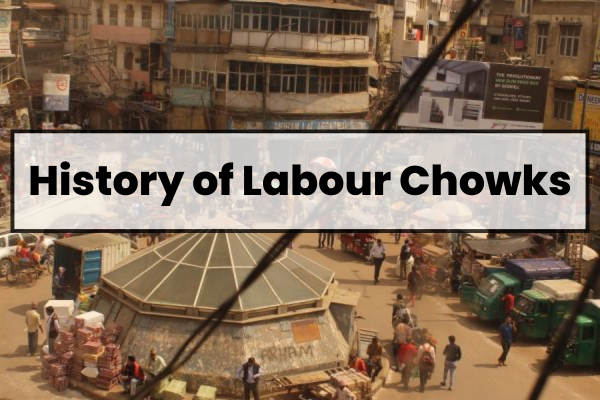
Origin and Evolution
Chowks have roots tracing back to the early days of urbanization when rapidly growing cities needed a reliable source of manual worker. These informal markets emerged organically, as workers and employers found convenient meeting points to negotiate daily work. Over time, Labour Chowks have evolved to meet the demands of modern economies, adapting to various economic and social changes. Their enduring presence reflects the ongoing need for flexible, readily available workers in urban areas, bridging the gap between job seekers and employers in a dynamic and ever-changing landscape.
Labour Chowks in Different Countries
The concept of Labour Chowks spans across continents, each adapting to regional economic and cultural contexts. In India, Labour Chowks are integral to cities like Delhi and Mumbai, providing essential services to the urban poor. In the Middle East, these hubs are crucial for migrant workers who rely on them for daily employment opportunities. Similarly, in Latin America, Labour Chowks play a significant role in cities such as Mexico City and São Paulo, where they are vital for workers seeking to support their families amidst economic uncertainties. These global variations highlight the universal importance of Labour Chowks in urban economies.
How Labour Chowks Function

Daily Routine Chowk
A typical day at a Labour Chowk begins early, with workers arriving at dawn to secure jobs. The scene is a blend of anticipation and negotiation as workers wait for employers who come seeking immediate manpower for various tasks. The bustling environment is characterized by quick discussions, skill assessments, and haggling over wages. By mid-morning, most workers have secured their jobs for the day, heading off to construction sites, homes, or businesses. The day concludes with the workers returning to their homes, hoping for another opportunity tomorrow.
Roles and Responsibilities
At Labour Chowks, roles are diverse and cover a spectrum of skills. Skilled workers, such as carpenters, electricians, and plumbers, are sought after for their specialized expertise. Unskilled workers handle general tasks like carrying materials, cleaning, or simple construction duties. Semi-skilled workers, who have some training but are not fully specialized, often assist skilled workers or take on supervisory roles. This structure allows Labour Chowks to cater to a wide range of employment needs, ensuring that employers find the right match for their specific job requirements.
Payment and Negotiation
Payment at Labour Chowks is typically negotiated on the spot, reflecting the informal nature of these markets. Rates vary depending on the type of work, skill level required, and duration of the job. Skilled workers command higher wages due to their expertise, while unskilled workers earn less. Negotiations can be quick but are crucial, as both parties strive for a fair deal. Payments are usually made daily, providing immediate financial relief to workers. However, the lack of formal agreements can sometimes lead to disputes, emphasizing the need for clear communication and mutual trust.
Types of Workers at Labour Chowks
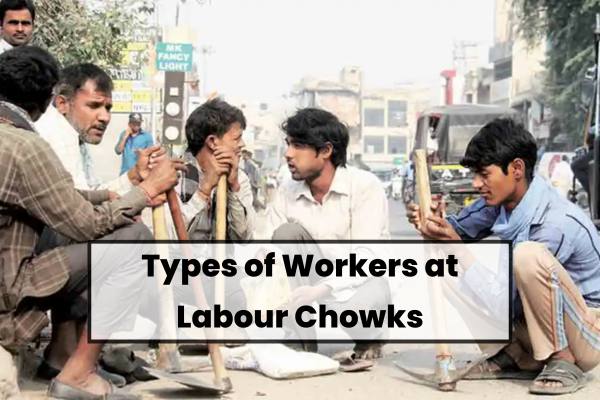
Skilled Labour
Skilled workers at Labour Chowks possess specialized training and expertise in specific trades. These workers include carpenters, electricians, plumbers, and masons, who are adept at handling complex tasks requiring precision and technical knowledge. Their skills make them highly sought after, allowing them to command higher wages. Employers often prefer skilled Workers for projects that demand quality workmanship and reliability. These professionals contribute significantly to construction, repair, and maintenance projects, ensuring that technical standards are met and enhancing the overall quality of work in urban development and infrastructure projects.
Unskilled Labour
Unskilled Workers form the backbone of Labour Chowks, providing essential manpower for various tasks that require physical strength but minimal training. Their roles typically include manual Worker such as carrying materials, digging, cleaning, and assisting in construction work. These workers are crucial for tasks that require endurance and hard work but do not necessitate specific skills. Despite earning lower wages compared to their skilled counterparts, unskilled Workers are indispensable in many sectors, helping to drive productivity and efficiency in industries that rely heavily on physical labour.
Semi-Skilled Labour
Semi-skilled Workers occupy a middle ground between skilled and unskilled workers. They possess some training and experience, enabling them to perform tasks that require more than basic physical Worker but do not demand full specialization. Examples include machine operators, drivers, and construction assistants. These workers often assist skilled labourers, handle machinery, or take on supervisory roles for unskilled tasks. Their versatility and ability to adapt to various job requirements make them valuable assets in Labour Chowks, as they can contribute to a wide range of projects, enhancing overall workforce efficiency.
Impact of Labour Chowks on Local Economy
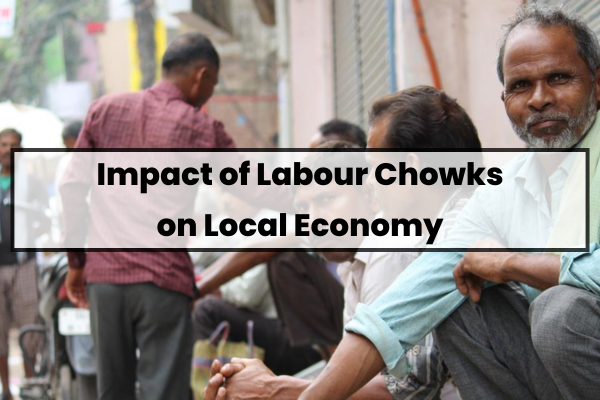
Economic Benefits
Labour Chowks provide significant economic benefits to local economies by supplying a flexible and readily available Work force. Businesses can efficiently meet their short-term and immediate labour needs without the long-term commitment of permanent hires. This adaptability helps companies manage costs and respond swiftly to fluctuating demand, thereby maintaining productivity and competitiveness. Additionally, Labour Chowks support the livelihoods of countless workers, enabling them to earn daily wages and contribute to the local economy through spending on goods and services, thus fostering economic activity and growth in urban areas.
Challenges Faced
Despite their benefits, Labour Chowks face several challenges that impact their effectiveness and sustainability. Workers often experience job insecurity and income instability due to the informal and day-to-day nature of their employment. The lack of formal contracts and legal protections makes them vulnerable to exploitation and unfair Worker practices. Moreover, the absence of health and safety regulations can lead to hazardous working conditions. These challenges underscore the need for reforms to provide better support and protection for labourers, ensuring that Labour Chowks can continue to function as vital components of the local economy while safeguarding workers’ rights and well-being.
Case Studies
Labour Chowks in India
In India, Labour Chowks are integral to the urban landscape, particularly in bustling cities like Delhi, Mumbai, and Kolkata. These informal markets serve as lifelines for millions of workers who migrate from rural areas in search of better employment opportunities. In Delhi, for instance, Labour Chowks are scattered across the city, providing a critical meeting point for day labourers and potential employers. The workers here offer a wide range of services, from construction and carpentry to domestic help and gardening. The economic significance of these hubs cannot be overstated, as they not only support the livelihoods of the workers but also enable small and medium-sized businesses to access affordable labour. However, the challenges are equally significant. Workers often face issues such as job insecurity, lack of social security, and exposure to hazardous working conditions. Efforts by NGOs and government initiatives aim to improve conditions by providing health check-ups, skill training, and legal assistance to these labourers, reflecting a growing recognition of their crucial role in the urban economy.
Labour Chowks in the Middle East
In the Middle East, Labour Chowks are predominantly populated by migrant workers from South Asia and Africa. These workers gather in designated spots in cities like Dubai, Riyadh, and Doha, seeking daily employment in construction, maintenance, and domestic work. The reliance on migrant Worker in the region is substantial, driven by large-scale infrastructure projects and a high demand for manual labour. While these Chowks provide essential employment opportunities, the workers often face challenging conditions, including legal and social barriers, limited labour rights, and harsh working environments. Organizations and embassies sometimes offer support services to help these workers navigate their difficult circumstances.
Labour Chowks in Latin America
In Latin America, Labour Chowks are vital components of the urban economy, especially in cities like Mexico City, São Paulo, and Buenos Aires. Here, workers congregate in public squares and roadside locations, offering their services for construction, landscaping, and various manual tasks. The informal nature of these markets allows for flexibility but also brings challenges such as job instability and lack of legal protections. In Mexico City, for example, Labour Chowks provide critical Worker for the construction boom, enabling rapid urban development. Initiatives by local governments and NGOs are increasingly focused on improving the working conditions and legal status of these labourers, recognizing their contribution to the city’s growth while addressing the vulnerabilities they face.
Social Dynamics at Labour Chowks

Worker Relationships
Worker relationships at Labour Chowks are a mix of camaraderie and competition. On one hand, workers form tight-knit communities, offering support, sharing resources, and exchanging job leads. This sense of solidarity helps them navigate the uncertainties of daily employment. On the other hand, the competitive nature of securing jobs can sometimes strain these relationships, leading to rivalries. Despite this, the overall environment is often cooperative, with workers relying on each other for emotional and practical support, creating a unique social fabric within these informal markets.
Employer-Worker Interactions
Interactions between employers and workers at Labour Chowks are typically transactional but can also be personal. Employers often return to reliable workers, creating a sense of trust and familiarity over time. Negotiations over wages and work terms are common, requiring clear communication and mutual respect. While some employers value the skills and reliability of regular workers, others may exploit the informal nature of these markets, offering low wages and poor working conditions. Overall, the dynamics hinge on mutual benefit, with both parties aiming for satisfactory agreements.
Community Support
Labour Chowks often function as informal community support networks. Workers share information about job opportunities, legal rights, and available social services. They also provide each other with practical assistance, such as lending tools or sharing meals. This community spirit is crucial for workers who face economic and social uncertainties. Additionally, local NGOs and community organizations frequently step in to offer support, providing health check-ups, legal aid, and educational resources. This collective approach helps workers manage the challenges of informal employment, fostering resilience and solidarity within the Labour Chowk environment.
Legal and Regulatory Aspects

Labour Laws
Labour laws governing Labour Chowks vary widely across countries, often leaving these informal markets in a legal gray area. In many places, the lack of formal contracts and regulation means that workers have limited protections and rights. This can result in issues such as wage theft, unsafe working conditions, and lack of job security. Efforts to formalize these markets and improve legal frameworks are ongoing, aiming to provide better protections for workers and ensure fair labour practices. However, implementing and enforcing these laws remains a significant challenge due to the informal nature of these employment practices.
Worker Rights and Protections
Worker rights and protections at Labour Chowks are often minimal due to the informal nature of these employment markets. Workers typically lack access to benefits such as health insurance, paid leave, and retirement savings. Legal protections against exploitation, discrimination, and unsafe working conditions are also limited. In response, some local governments and NGOs are working to enhance worker rights through initiatives that provide legal aid, health services, and skill development programs. These efforts aim to improve the working conditions and overall welfare of labourers, but achieving comprehensive protection remains an ongoing struggle.
Technological Influence on Labour Chowks

Digital Platforms for Labour Hiring
Technological advancements are significantly transforming Labour Chowks through digital platforms. These platforms facilitate more efficient matching of workers with employers, improving transparency and reducing the need for physical presence. For example, mobile apps and online portals allow employers to post job requirements and workers to apply from their smartphones. This digital approach streamlines hiring processes, offers real-time updates, and ensures fairer wage negotiations. The integration of technology also helps track job performance and payment histories, enhancing trust and accountability in the informal labour market. These innovations are gradually shifting traditional Labour Chowks towards more modern, efficient models.
Digital Labour Chowk (DLC)
Digital Labour Chowk (DLC) represents a significant technological advancement in the labour market. As India’s first technology-driven labour marketplace, DLC aims to replace traditional physical Labour Chowks with a digital platform that connects daily wage and migrant construction workers with job opportunities nationwide. By leveraging technology, DLC seeks to formalize the labour industry, enhancing transparency and efficiency while improving workers’ income levels. This digital transformation promises to integrate more workers into the formal economy, offering better job security and access to fair wages, ultimately contributing to the country’s economic development and the empowerment of its labour force.
Technology Bridging the Gap
Technology is reshaping Labour Chowks by introducing digital solutions that enhance efficiency and transparency. Mobile apps and online platforms now allow workers and employers to connect without the need for physical presence, streamlining job matching and negotiations. These technological tools provide real-time updates on job opportunities, enable secure payment systems, and help track employment history, fostering trust and accountability. The adoption of technology not only modernizes the traditional Labour Chowk model but also improves overall operational efficiency, paving the way for more organized and equitable labour markets.
Challenges Faced by Workers

Health and Safety Concerns
Health and safety concerns are prevalent among Labour Chowk workers. Many are exposed to hazardous working environments without adequate protective gear or safety protocols. The informal nature of these jobs often means that employers do not provide health insurance or access to medical care, leaving workers at risk of injury and illness. The lack of safety regulations and proper health measures exacerbates these risks, making it crucial to improve occupational safety standards and provide better support for these vulnerable workers.
Lack of Legal Protections
Workers at Labour Chowks frequently face a lack of legal protections. The absence of formal employment contracts and regulations leaves them vulnerable to exploitation, unsafe working conditions, and unfair wages. Without access to legal recourse or labour rights, these workers often endure poor working conditions and inadequate safety measures. The lack of legal support further exacerbates their challenges, making it difficult to address grievances or seek compensation for injustices.
Job Insecurity
Job insecurity is a significant challenge for workers at Labour Chowks. The informal nature of these markets means that employment is often short-term and unstable, leaving workers uncertain about their next job. Without formal contracts, workers lack guarantees of continued employment or income stability. This precarious situation makes it difficult for them to plan long-term finances and manage personal expenses, contributing to a cycle of economic vulnerability and financial stress.
Support Systems for Labourers
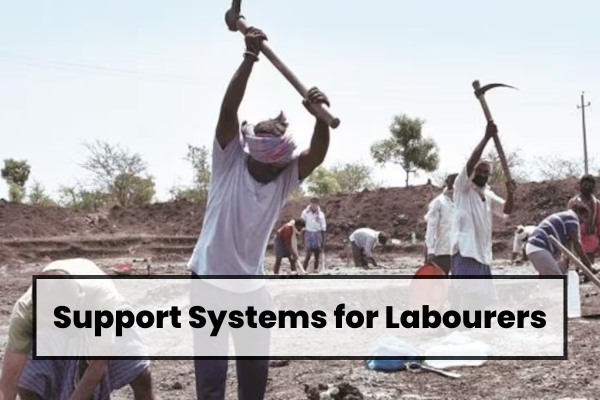
Government Initiatives
Government initiatives play a crucial role in supporting Labour Chowk workers by providing essential services and protections. Programs may include health and safety regulations, skill development training, and financial assistance. For example, some governments offer healthcare schemes, subsidized housing, and legal aid to improve workers’ living conditions and work environments. Additionally, efforts to formalize the labour market and enhance labour rights are crucial in offering more stability and security to these workers.
Non-Governmental Organizations
Non-Governmental Organizations (NGOs) are instrumental in providing support to Labour Chowk workers. They offer a range of services including health check-ups, legal assistance, and educational programs. NGOs also advocate for workers’ rights, help improve working conditions, and provide emergency support in cases of financial hardship. Through community outreach and advocacy, these organizations play a vital role in enhancing the well-being and empowerment of workers, often filling gaps left by formal support systems.
Community Support Groups
Community-based support systems are essential for the welfare of Labour Chowk workers. Local community groups often provide informal assistance, such as sharing job information, offering basic necessities, and facilitating social support networks. These grassroots initiatives help workers navigate daily challenges and build a sense of solidarity. By fostering a supportive environment and sharing resources, community-based efforts contribute significantly to the overall stability and resilience of workers in informal labour markets.
Future of Labour Chowks
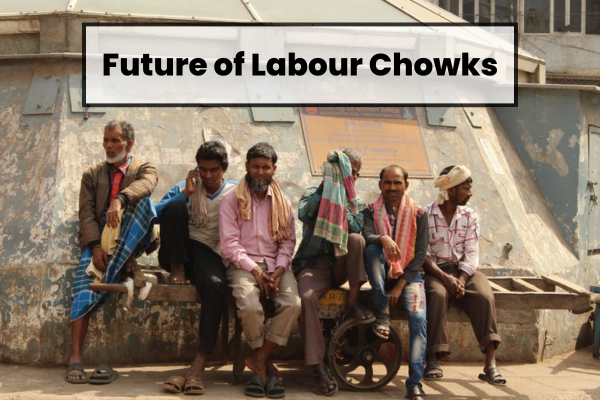
Technological Integration
The integration of technology promises a transformative future for Labour Chowks. Platforms like Digital Labour Chowk (DLC) are pioneering this change by digitizing job matching and payment processes, enhancing transparency, and improving efficiency. This digital shift will streamline operations, making it easier for workers to find jobs and for employers to hire reliable labour, ultimately formalizing the informal labour market.
Regulatory and Social Reforms
Regulatory and social reforms will further shape the future of Labour Chowks. Government initiatives and NGO support aim to provide better legal protections, health benefits, and skill development programs. These efforts will improve working conditions, ensure fair wages, and enhance job security, helping to integrate Labour Chowk workers into the formal economy and elevate their quality of life.these hubs more sustainable.
Benefits of Using Labour Chowks

Cost-Effectiveness
Labour Chowks offer a cost-effective solution for businesses seeking temporary manpower. By providing access to daily wage workers, these informal markets enable employers to meet their labour needs without the long-term financial commitments associated with permanent hires. This flexibility allows companies to manage labour costs efficiently, particularly for short-term projects or seasonal demands. The availability of affordable labour from Labour Chowks helps businesses control expenses and maintain competitiveness in the market.
Flexibility
Flexibility is a key benefit of Labour Chowks, offering businesses the ability to quickly scale their workforce up or down based on immediate needs. This adaptability is crucial for industries with fluctuating demands, such as construction and agriculture. Employers can hire workers on a daily basis, ensuring that labour costs are aligned with current project requirements. This flexible workforce model helps businesses respond to dynamic market conditions and maintain operational efficiency.
Access to Diverse Skill Sets
Labour Chowks provide access to a diverse range of skill sets, catering to various industry needs. Workers at these hubs include skilled labourers like electricians and carpenters, as well as unskilled labourers for general tasks. This diversity allows employers to find the right talent for specific jobs without extensive recruitment processes. The broad spectrum of available skills at Labour Chowks ensures that businesses can meet specialized requirements and complete projects efficiently, benefiting from a versatile and adaptable labour pool.
Alternatives to Labour Chowks

Online Labour Platforms
Online labour platforms are emerging as a modern alternative to traditional Labour Chowks. These digital platforms connect workers with employers through websites and mobile apps, offering a more organized and efficient job-matching process. For instance, platforms like Digital Labour Chowk (DLC) in India provide a structured marketplace where workers can list their skills and availability, and employers can post job requirements. This method enhances transparency and reliability, ensuring fair wages and safer working conditions. The use of technology also enables better tracking of employment history and payments, reducing disputes and enhancing accountability. Furthermore, online labour platforms often offer additional services like skill development and health insurance, improving the overall welfare of workers. By leveraging the convenience and reach of the internet, these platforms are transforming the informal labour market into a more formalized and professional sector.
Formal Employment Agencies
Formal employment agencies provide another viable alternative to Labour Chowks, offering structured and regulated job placement services. These agencies recruit workers, verify their credentials, and match them with suitable employers, ensuring a higher level of professionalism and reliability. Unlike informal Labour Chowks, employment agencies often provide contracts, ensuring legal protections and job security for workers. They also offer benefits such as health insurance, training programs, and career development opportunities, which can significantly improve workers’ quality of life. For employers, agencies offer a streamlined hiring process, reducing the time and effort spent on recruitment. By conducting background checks and skill assessments, these agencies ensure that employers find qualified and trustworthy workers. This formal approach not only enhances the efficiency of the job market but also promotes fair labour practices and worker rights, contributing to a more equitable and stable employment environment.
FAQs
What is a Labour Chowk?
A Labour Chowk is an informal marketplace where daily wage labourers gather to find work. Employers visit these spots to hire workers for various tasks, ranging from construction to domestic help. These markets operate primarily in urban areas, providing a critical link between workers and short-term employment opportunities.
How do Labour Chowks benefit the workers?
Labour Chowks provide workers with immediate job opportunities and daily wages. They offer a platform for unskilled and semi-skilled labourers to find employment without lengthy recruitment processes. This flexibility helps workers support their families and manage their finances despite the informal nature of the job market.
What types of workers can be found at Labour Chowks?
At Labour Chowks, you can find a variety of workers including skilled labourers like carpenters and electricians, semi-skilled labourers such as machine operators, and unskilled labourers who perform manual tasks like carrying materials and cleaning. This diverse workforce caters to various industry needs.
What challenges do workers at Labour Chowks face?
Workers at Labour Chowks face challenges such as job insecurity, lack of legal protections, and unsafe working conditions. The informal nature of these markets means workers often do not have contracts, benefits, or access to healthcare, making them vulnerable to exploitation and financial instability.
How can technology improve Labour Chowks?
Digital platforms improve Labour Chowks by offering efficient job matching, secure payments, and enhanced transparency. Platforms like Digital Labour Chowk (DLC) connect workers and employers online, reducing the need for physical presence and helping formalize the informal labour market. These innovations also track employment histories and ensure fairer wages.
What are some alternatives to Labour Chowks?
Alternatives to Labour Chowks include online labour platforms and formal employment agencies. Online platforms connect workers and employers through digital means, providing a structured job marketplace. Formal employment agencies offer regulated job placement services, legal protections, and benefits, ensuring higher professionalism and reliability for both workers and employers.
Conclusion
Labour Chowks play a vital role in connecting workers with immediate job opportunities, benefiting both labourers and employers. These informal markets offer cost-effective, flexible, and diverse labour solutions. However, challenges like job insecurity, lack of legal protections, and unsafe working conditions persist. Technological advancements, such as digital platforms, and support from government and NGOs are crucial in improving conditions and formalizing the labour market. Alternatives like online labour platforms and formal employment agencies provide structured and reliable job placement services. By addressing these challenges and leveraging technology, Labour Chowks can evolve into more efficient and equitable employment hubs.

